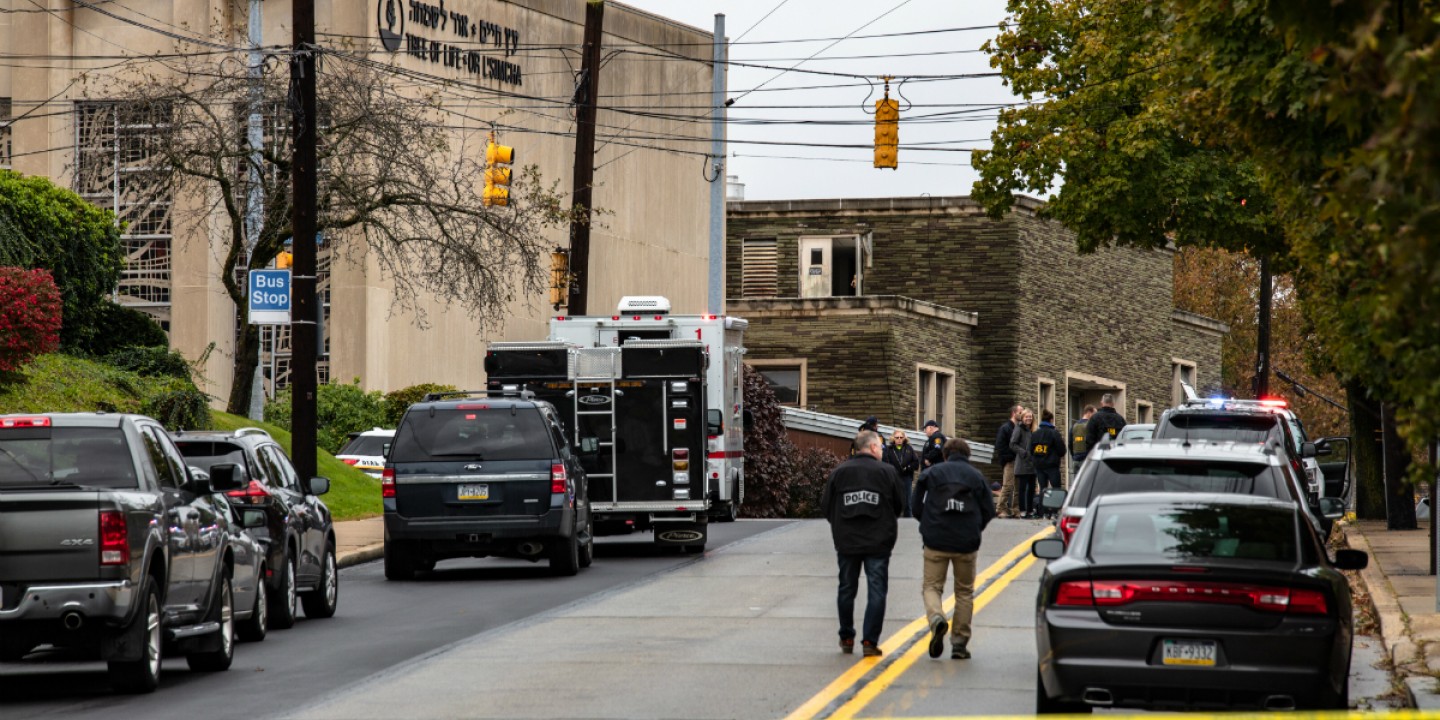Pittsburgh synagogue shooting strikes at vibrant Jewish community
The neighborhood’s unity has been evident in the wake of the murders during sabbath services.

[According to court documents, Robert Gregory Bowers, a 46-year-old white man, was charged the same day by both state and federal authorities for the murders and also for ethnic intimidation and obstruction of exercise of religious beliefs resulting in death and bodily injury. Bowers had written on social media about HIAS, a Jewish refugee resettlement organization, which he saw as a threat, according to news reports.]
Read our latest issue or browse back issues.
Squirrel Hill, in Pittsburgh’s East End, has been the center of the city’s Jewish life since the early 20th century.
“It may be the last major urban-centered Jewish community outside of Manhattan in the country,” said Jeff Finkelstein, president of the Jewish Federation of Greater Pittsburgh.
Today, the neighborhood is home to more than a dozen synagogues. Tree of Life–Or L’Simcha, the result of a recent merger, is Conservative. New Light Congregation, also Conservative, meets in the same building, as does Congregation Dor Hadash, which is Reconstructionist. There are also multiple Orthodox and Reform synagogues in the neighborhood, which is just over one square mile.
What sets Squirrel Hill apart, Finkelstein said, is the cohesiveness of its Jewish community. The wide range of denominations and Jewish organizations, he said, make an effort to collaborate with each other. At an all-night program this spring during the Jewish festival of Shavuot, 500 people from across the Jewish spectrum came to study together.
Bari Weiss, a New York Times columnist who celebrated her bat mitzvah at Tree of Life, wrote in response to the shooting, “There is a phrase in the Talmud that has always felt especially relevant to our community: Kol Yisrael Arevim Zeh Bazeh. All of Israel is responsible for one another. For us that is not a lovely theory but a lived reality.”
That communal unity, Finkelstein said, has been evident in the wake of the shooting. The local Jewish Community Center acted as a base for families of the victims, where rabbis from around the area visited throughout the day of the shooting. Jewish Family and Community Services of Pittsburgh provided counseling, while the Jewish Federation handled donations.
This is not the only time the community has experienced anti-Semitism recently. Last year, residents found stickers and business cards with white supremacist slogans around the neighborhood, featuring swastikas and messages such as “It’s not illegal to be white . . . yet.”
But Finkelstein said the October 27 events are the worst he has experienced in his professional life.
“This is the one day I hoped would never happen,” he said. “It’s about these families—my heart goes out to them. Just watching their emotions has shaken my soul.”
Beth Kissileff, an author and Squirrel Hill resident whose husband, Jonathan Perlman, is rabbi of the New Light Congregation, wrote a tribute to their three congregants who were killed on Saturday:
I never thought I would be writing about those who died al kiddush Hashem, sanctifying God’s name, people I knew and worshiped with. All three of these men were dream congregants, the kind every rabbi wants, those willing to do whatever is needed and go above and beyond the call of duty. . . . All the years of the lives of Daniel Stein, Richard Gottfried, and Melvin Wax were filled with goodness and devotion to Judaism.
Kissileff recalled how Wax “was always the first in the synagogue for each service.” Gottfried was due to retire soon, she wrote, and Stein “became a grandfather seven months ago. I wish his grandson could have gotten to know him.”
A version of this article, which was edited November 13, appears in the print edition under the title “Pittsburgh synagogue shooting shakes Jewish community.”





